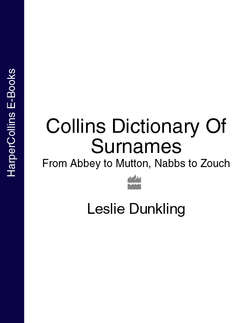Читать книгу Collins Dictionary Of Surnames: From Abbey to Mutton, Nabbs to Zouch - Leslie Dunkling - Страница 7
NAME MAGIC
ОглавлениеThe Anglo-Saxons do not seem to have duplicated personal names within the same community, nor did they re-use the names of distinguished ancestors. That situation changed when the Danes and Norwegians settled in Britain. They brought with them their own names, which were often similar to those of the Anglo-Saxons, but more importantly, they brought with them their own naming philosophy. As Sir Frank Stenton once expressed it, the Scandinavians believed that ‘the soul of an individual was represented or symbolised by his name, and that the bestowal of a name was a means of calling up the spirit of the man who had borne it into the child to whom it was given.’ Those words could, of course, be used of many modern parents. They name a child after an admired person in the hope that the qualities of that person will somehow be passed on to the new name-bearer.
This belief in name-magic meant that the Scandinavians deliberately re-used the names of famous chiefs or family friends when naming their children. By doing so, they had taken a step towards the modern situation where any number of children born in a particular year are likely to receive the same first name. There is nothing wrong with that system, but it makes a second name essential if an individual Daniel or Laura, say, needs to be identified more precisely.
